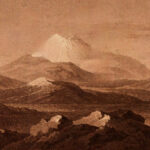When you reach this summit one of the most beautiful spectacles and one of the richest views in the world unfold before you…like the gods of Olympus, you believe you see the universe at your feet.
– Pierre Jean-Baptiste Legrand d’Aussy
France has many mountains, but only one Olympus: the puy de Dôme. Over the ages it’s been a major site not only of pagan worship, but also of scientific experimentation. In 1869, two hundred years after the Clermont-Ferrand born philosopher Blaise Pascal organised paradigm-changing physics experiments atop its misty heights, another aspirational thinker– physics professor Émile Alluard –spearheaded a plan to crown the summit with a historic observatory. Both these feats helped to catapult the puy to international renown in scientific circles. Accordingly, the stranger stories with which the mountain had previously been associated fell into obscurity.
One of these tales — and there are many — involves the Polignac family, an aristocratic house that ruled parts of Auvergne for centuries. The story goes that in 1785 the Duc of Polignac (presumably Armand Jules François) decided to host a lavish banquet on the summit of the puy de Dôme. But this was no ordinary banquet. The event reads like something out of Charles Dicken novel, an extreme example of the Ancien Régime’s excesses.
The following description is from Charles-Marie d’Irumberry’s Mon voyage au Mont d’Or (1802):
“It was on this platform [the puy] in 1785 that the Duc de Polignac assembled the prettiest women of Clermont, along with the officers of his regiment, and gave them a superb meal…Above the clouds, with thunder at his feet, savouring better than nectar and ambrosia, an earthen god was undoubtedly allowed to believe himself at a table in Olympus.”
Interestingly, this was not the Polignac family’s first time to link itself to the deities of the Classical age. Earlier, family members had supported fictitious claims that their dynastic holdings in Velay included a “temple of Apollo”.
For more anecdotes on Auvergne, click “History and Literature” below.





